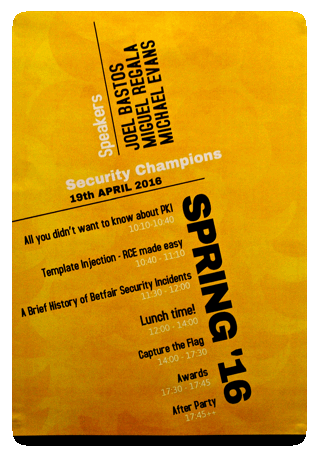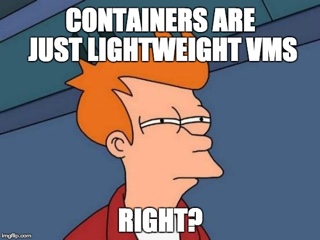Survival guide to tech conferences

Everyone that is fortunate enough to attend tech conferences has different perspectives, and expects different outcomes and benefits from these type of events. I commonly see three types of participants, there might be more or even combinations of these:
- There are the ones that just want to watch the talks, even if it’s on a TV outside the room where the presentation is happening;
- Others use conferences as an excuse to party hard with teammates and don’t even stop by the venue;
- Lastly, the ones who aim to meet others with similar interests and grab the opportunity to discuss problems/solutions with different experts.
If you are the type of participant that’s exclusively interested in the talks themselves, you should know that nowadays the majority of the biggest events will publish online at least the most renowned presentations, usually with better quality than the live ones and with a richer viewing experience if you’re unfortunate to get a bad seat at the venue. Taking this into consideration will save you time/money - you no longer have to take care of trip/accommodation details, and it gives you the option to speed up playback and maximize the ingest of information.
If you just want to have fun or get to know a different city using a conference as an excuse, there’s not much I can tell you except you should be calling it a team activity or vacation instead of training.
High Mojito Availability
— Joel (@kintoandar) June 7, 2016
Cause sometimes all you need is some downtime...#oreilly #sre #devops #vacation pic.twitter.com/otrtbfyhtg
On the contrary, if your interest is to appreciate conferences as a networking opportunity, a chance to get answers from others that went through similar problems or to meet the rockstars in your field, then you stumbled upon the right post. Here, I hope to crystallize my current views on this subject and give you some guidelines on how to prepare yourself and get your way around conferences.
Step 1 - Choosing the conference(s)
From my own experience, what I value the most are open source, operations, culture and community oriented conferences. As such, I usually end up hearing about them through friends, Twitter, my personally curated RSS feeds or searching on Lanyrd. Try to find the keywords that define your interests, they’ll be useful when searching or even tweeting. Some of mine are:
devops(not as in job title)SREopensourceculture
When choosing where to spend your time and money, you should try to find out who will be speaking, if there are any presentations that you are eager to watch, if there are any companies attending that you want to get acquainted with, and even what type of audience the event has. If we’re talking about a conference that you’ve never heard of, you should also try to do a background check (see previous editions, confirm the feedback on social media, that sort of thing).
Step 2 - How to get there
There are various options on how to attend conferences, like being a speaker, a participant, a sponsor, a volunteer, or even a organizer. Since my experience is mostly in the first two categories, I will only focus on them. It’s not always easy to be a speaker at an event (and I will explain more later on) but, if you want to get out there, you can start by applying to lightning talks or submit papers to the events you’re most fond of.
Then there’s the question of financing your participation. Being a speaker might help, since some conferences cover the speaker’s’ expenses. Paying from your own pocket is always an option and might provide more value to your spendings. Alternatively, your company may have set a budget for training, such as for online courses, certifications and/or conferences, among others. I’ve never seen much value on certifications (this could be an entire post all together), but I do see numerous benefits in attending conferences.
Step 3 - Call for papers
Not everyone is comfortable giving a speech to hundreds. Heck, I bet most people don’t. Being completely honest, public speaking still makes me physically ill, but that doesn’t stop me from stepping outside my comfort zone and enduring the pain, either for a very good reason or to prove I can do it (and no, I don’t think it becomes easier with practice). Still, there are some pretty good benefits in talking to a broader audience. Here are some highlights from my personal experience:
- Back in 2012 I became an Ansible supporter and, as such, I did several talks and workshops about the tool. This helped me introduce the technology on two different companies and become more knowledgeable of it. And guess what? Both companies are now heavily using it and even contributing to the project.
@darkflib I've never heard of #ansible but if it's from #cobbler creator, it's worth a try. Thanks for the tip ;)
— Joel (@kintoandar) April 12, 2012 - During a Config Management Camp, the Chef community, more precisely Michael Ducy and Nathen Harvey, invited its members to give lightning talks about anything Chef related. I jumped into the stage and, even with my voice trembling, I shared some key elements of what I’ve learned in my professional experience, while proving myself capable of such an attitude. I felt terrified and exhilarated, but it ended up being unforgettable for the best of the reasons - I was giving something back to the community and that feeling is priceless.
Achievement Unlock: Give a micro lightning talk to the #chef community on #cfgmgmtcamp! Thanks @nathenharvey
— Joel (@kintoandar) February 4, 2014@kintoandar nice job
— Michael Ducy (@mfdii) February 4, 2014@kintoandar you rocked it!
— nathenharvey (@nathenharvey) February 4, 2014 - At one time, I was keen on using the operating system as an artifact of the delivery pipeline, just like any other application running on it, providing a consistent, versioned and automated way of creating machines. I took the opportunity of another presentation I was making and also introduced this subject, which eventually was implemented and accepted by my colleagues across the company.
- Once I got tired of recurrently dealing with Public Key Infrastructure (PKI) issues, so I prepared a presentation for my colleagues about the fundamentals of PKI. I already gave this talk 3 times (one in Portugal, other in Romania, and another in a Security Event) and the outcome couldn’t be better - it helped reduced the toil of dealing with PKI related issues, which showed me that sometimes you really have to put yourself out there.

Had I not made these and other presentations, I probably wouldn’t have had the opportunity to spread out my view on these subjects, to give something extra back to the community and to reach others that I otherwise wouldn’t.
Another outcome of being a speaker is the questions you’ll receive, which will open even more opportunities to exchange perspectives, to be challenged on your assumptions and to ignite meaningful discussions. I just love talking about technology, it truly does make me happy, so getting interesting questions/problems makes my day! All of this will help you be a better professional and a better person.
Step 4 - The corridor approach
When attending an event, really appreciate the corridors. You can always have the stage later in the comfort of your living room on video (if the organization provides it), but you rarely have the same opportunity to be with those people around you.
Almost everybody likes to meet new people, but sometimes it can be frightening, depending on who you’re talking to, or even on your own personality. In either case, it’s once again important to get out of your comfort zone and, for me, the key element to have in mind when approaching others is empathy.
You should always do your homework so you know whom is present at the event and whom you want to meet. It’s also important to have a sense of when you should introduce yourself and how can you engage in conversation and make a good first impression.
Do your homework (but don’t be a stalker)
Really study the conference schedule. Try to find out more about the speakers, especially if there are multiple tracks simultaneously. Who and what captures your attention? Usually, most conferences help you by providing some insightful information on the speaker and an abstract of the talk. Do your best to choose wisely.
Introducing yourself
Understand who might be at the conference. Depending on the type of conference it is, and even who the supporting/sponsoring entities are, you can easily have an idea of who might be present. If someone interesting is (or might be) attending and you have specific questions for them, you can try to schedule a quick chat with them beforehand. This also helps eliminating most of the awkwardness of a corridor incognito approach.
@niallm so, apparently will be attending your presentation at #SREcon16Europe :D
— Joel (@kintoandar) July 9, 2016
Any chance to talk a bit offline during the week?
@kintoandar Certainly. We can take it ad-hoc or DM me for email
— Niall Murphy (@niallm) July 9, 2016
If you are on site and just spotted someone you’d like to meet, or if a speaker caught your attention and you want to continue the conversation, be aware that there might never be a perfect time for you to introduce yourself. So how do you choose the timing?
Here is where empathy is firstly appreciated. Ask yourself if the person seems free or if he/she seems like you could approach them. If the person seems to be working or if it’s having an interesting conversation with someone else, maybe it’s not a good time to go for it. Think of it as the working environment in an office, if a colleague is “in the zone” you wouldn’t interrupt him/her, would you?
Now that you came up with the perfect timing, are you up to deal with the outcome? For all you know, this person can be a total jerk… But take my advice: I’m yet to meet someone like that and find myself in an awkward situation.
Social interaction has its toll on your energy, and depending on whom you are approaching, they may also be tired. Be aware of their body posture, their mood, read the signs, know when you are disturbing them and, above all, be empathetic. If this is the case, ask for a time to chat another day - the hardest part is done anyway!
Social Interaction
When engaging in a conversation, be sure to have great questions to ask. In an event it gets tiresome to receive the same questions over and over again, which is more common within the rockstars/speakers. Again, be empathetic and come up with questions that are both interesting and help you give a great first impression and be seen as someone interesting to talk with.
In my humble opinion, what defines a good question is one that can not be easily answered or simply researched, it requires experience to be fulfilled.
Something I just love asking, if the person has the time for it, is “what’s your life story, how did you get where you currently are?”. Once I asked John Willis about it and he shared an awesome life story with me. Such a short question, such an engaging answer. I feel that this question is a great way to show that you are truly interested in getting to know the other person and make a connection.
To illustrate what I mean, here are some of the most memorable questions I’ve had the opportunity to ask during conferences:
- I’ll never forget when I questioned Jon Cowie on what, in his perspective, defines a Senior Professional (title apart, obviously).
- Or when I asked Kurt Andersen how Linkedin maintains software/procedures coherence having multiple SRE teams instead of a single one.
- Another time, I asked Kelsey Hightower about his vision for the next 5 years in the tech world and if all the fuss around unikernels was justified.
Achievement Unlocked: Get a signed copy of "#Kubernetes: Up and Running" pic.twitter.com/cq3Hwh21n3
— Joel (@kintoandar) October 31, 2015 - I also had the opportunity to question Gareth Rushgrove on how to go about testing the infrastructure that is always changing and evolving.
- On one occasion, I was lucky enough to inquire Patrick Debois regarding Disaster Recovery planning in complex infrastructures.
Post-It extravaganza, sponsored by @patrickdebois pic.twitter.com/iHrqRPn7p3
— Joel (@kintoandar) June 21, 2014 - Once I was talking with Niall Murphy about management issues, particularly, how a team changes from a project-oriented mentality to task-oriented one, with all the loss of visibility, responsibility and ownership and what that ensues (and no, I’m not a manager). Not only he gave me his vision on the subject, he also recommended me Liz Fong-Jones. I was blown away! How didn’t I knew about her sooner?
If there's a talk about management you should watch, this is it!https://t.co/QjSTeBB28a https://t.co/VAz8nU8CdE
— Joel (@kintoandar) September 27, 2016 - Therefore, during a lunch break, I politely asked if I could join her. Liz welcomed me to the table and I questioned her what were the true benefits of having a manager. Both her’s and Niall’s answers helped make a very tough decision.
I truly value these opportunities and, as I do see value in good questions and engaging in great conversations, I always hope the person in question will also feel the same.
Getting around
While getting yourself around, you are also susceptible to be approached by others. And I believe you should make an effort to show you are approachable. People don’t like leaving the comfort zone, I sure don’t, but if you stay in a closed group, others won’t try to interact with you.
Use the sponsors booths to learn more about their companies/products and dig deep into the themes you’re interested in. I had very enlightening conversations about infrastructure stacks, automation techniques and procedures from booths that weren’t even related with those kind of topics. At one time, I had a noteworthy discussion with a Google HR at their booth on how they were rated in performance reviews if there’s a conflict of interests, as their goal should be increasing candidate’s applications, but the teams are concerned with the quality of new hires and not wasting time on meaningless recruitment attempts.
Even though I don’t consider myself an extrovert, at conferences I always try to be hyper-social in order to guarantee that I meet exactly whom I want to and others alike, not giving a chance to second thoughts or hesitations.
Step 5 - Timeline of events
As part of the process of attending a conference, usually we are asked to write post-event reports of what we’ve seen. We’ve all been there, struggling to remember every talk, or even the highlights of a speech. One tool I find to be the best note-taking app for tech conferences is Twitter. Not only it helps keep track of the most relevant talks and moments (adding photos and comments), which you can afterwards use to write the reports, it turned out to have several other perks, such as:
- By using the conference hashtag, you help the event gather traction
- By referring a speaker, you help him/her reach a broader audience
- By maintaining a timeline of a topic, you also allow the discussion to go beyond the presentation itself
- You deliver information on what’s going on to the community
- You show what the highlights are (in your opinion, obviously)
- You delineate your twitter profile and make new friends in the process
I’ve also found out that this approach helped me meet on site other participants with similar interests as mine and eager to further discuss those topics in person. Per example:
- It boosted me to get in touch with Diego Pettenò and get a better understanding regarding on-call in a Google SRE team.
- André Medeiros spotted one of my tweets and promptly invited me to Shopify’s booth where he was showcasing and we had an insightful conversation about the company.
- Or that time when Acácio Cruz, former Google SRE Director, invited us alongside with a Zalando group of Portuguese to drink some pints at the bar.
These kind of casual encounters are prone to happen when using the conference hashtag.
If you’re not familiar with Twitter, start by following the conference you are attending and see the dynamic. Most tech events have nowadays a tweet wall and when you use their hashtag you’re instantly posted on the wall, which also guarantees you more visibility at the event.
I started this method of keeping track of things almost by accident, but now that I understand the benefits it carries I recommend you also give it a try.
Here are some of my previous timelines if you want to give a look:
Disclaimer
All opinions are exclusively my own. I wouldn’t say this approach is perfect but it has worked for me for a very long time, not only at conferences but meetups alike.
Obviously, if you see me around please feel free to say hi and bring in questions if you have them!
To all that made this post possible
Thank you all for having a minute to spare with someone that is curious by nature and relentless to find answers, I deeply appreciate your time.





Leave a comment